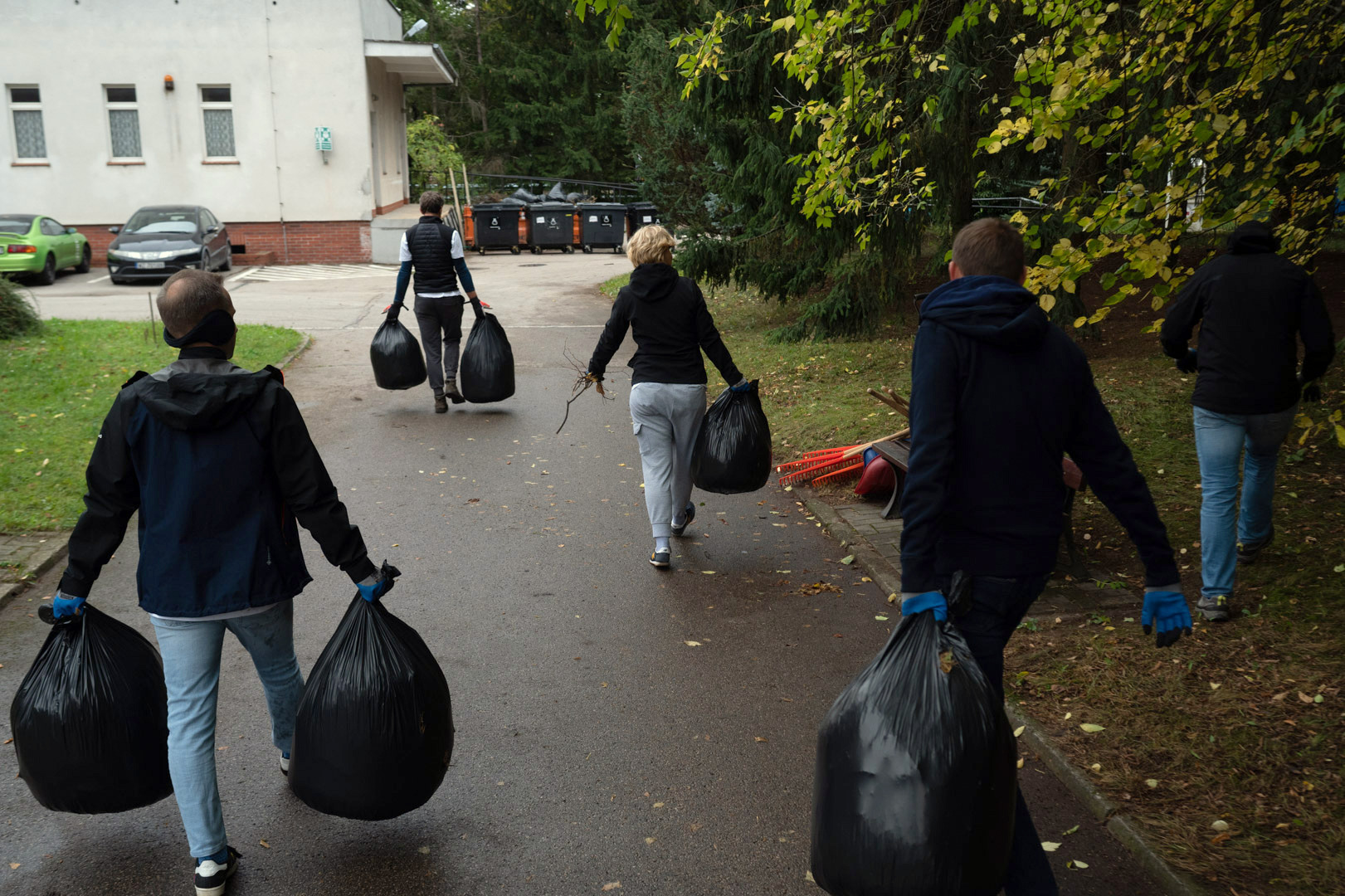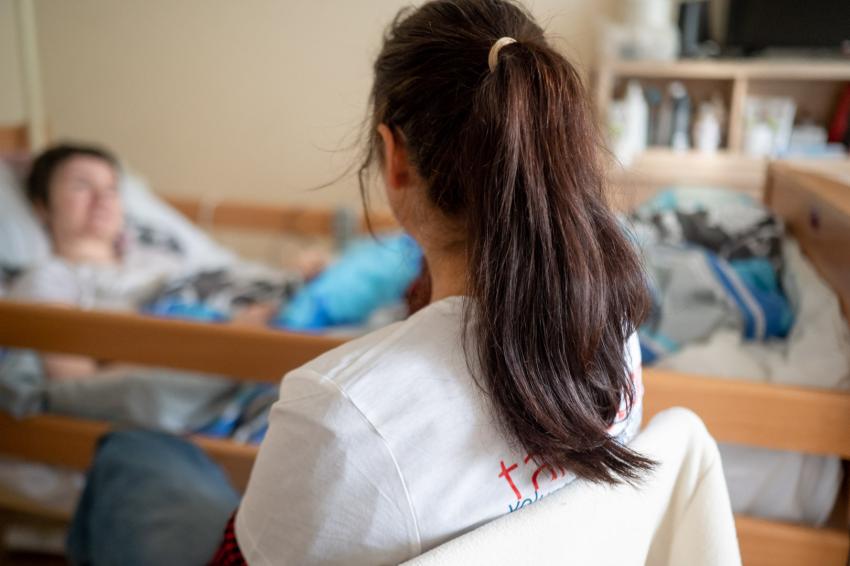Interviewed by Stéphanie Andrieux, edited by Anna Maheu.
What's the story behind the Stowarzyszenie Centrum Wolontariatu, or the Center, as you call it?
Agnieszka Lissowska-Lewkowicz: The Center began its activities in 1993. After a few study visits in different European and American countries, our founders thought that the volunteering system in Poland needed professional support. The following year, they opened Poland's first volunteering center based in Warsaw. It became a contact point connecting volunteers with organizations interested in their help.
In 1995, the Center initiated a network of Volunteer Centers all around the country, while forwarding a professional approach to volunteering. In 2002-2003, it took part in writing the Act on Public Benefit Activity and Volunteer Work. Throughout three decades, our association was also involved in all important voluntary events, including the European Year of Volunteering 2011, the Euro 2012, and World Youth Day 2016.
Do you still help people find volunteering opportunities?
No, we don't do that any more, even though other volunteering centers still do. In Warsaw, we now have a municipal system for that. In 2014, the Volunteer Center implemented the “Warsaw Volunteers” in partnership with the City of Warsaw, so we have been working hand in hand for quite some time.
Today, the Center focuses on helping those who work with volunteers. We collaborate with NGOs, institutions, and companies implementing corporate volunteering programs. We also train volunteer coordinators.
As the Center’s board president, I'm also involved with different institutions, including a short-lived working group by the Ministry of Civic Society1. We were trying to change our old law to make it more flexible and adjusted to modern times.
Does the legal system currently limit volunteering?
In Polish law, you can have a volunteer with no formalities for a month. Then you must make them sign the agreement. If the person refuses, which happens more and more, they can no longer volunteer.
It is indeed quite strict; the French law doesn't go into these details.
The main reason is that it's connected with an insurance, so if something happens, you are responsible for this person. But the law has become obsolete with the rise of nonformal activism, or informal volunteering.
Do you notice a rise in informal volunteering in Poland?
Yes, we do. It can take many forms, including neighborhood help and online activism. It started during the pandemic, then it rose again during the Russian invasion of Ukraine. Now it's mostly popular among young people because they are not as attached to one organization. They are less inclined than their seniors to sign the volunteering agreement I mentioned earlier. It was an important discussion in our working group with the Civil Society ministry: what do we do with this activism? Can we integrate it into our law? Or should it focus mainly on formal volunteering as it does today?
Do you see other ways volunteering could improve?
As a sector, we need money to improve the volunteers' experience. You can't have a good, structured volunteering project in your organization without investing in it. A fundamental part of that is professional volunteer coordination. Today, everyone knows what a project coordinator does. But practices are not as widely shared for volunteer coordinators. This job must be taken seriously. It starts with specific paths in university, qualifying training courses, and clear job descriptions.
Did you know that Juan Ángel Poyatos, the founder of Volies and a member of Points of Light, is working on that topic in Spain?
Oh, I didn't know. But I am not surprised: this is an important topic across European countries, and we should work on it together.

In fact, who is volunteering in Poland? Is there a typical profile of volunteers?
No, I would say everyone volunteers at least once in their life, thanks to our well-structured school volunteering. All the pupils volunteer in primary school. They have extra credits for their volunteer work, which can help them go to better high schools. It works mostly in big cities, where there is quite a competition for good education.
Apart from this structured school volunteering, many young people volunteer. The age category that volunteers less is mine: middle-aged people lack time to volunteer because they work and take care of their families. Nevertheless, we are seeing more corporate volunteering, as well as family volunteering. Finally, seniors are quite numerous among volunteers. They enjoy volunteering because it is an opportunity to be active and to feel needed. So, youngsters and seniors are the strongest groups in terms of time spent. But you can find volunteers in every age group.
Interesting. In France, the proportion of seniors volunteering is going down2. Do you notice a similar shift?
I don't think so. Maybe there's a small number of seniors who stopped volunteering to do different things and just spend time with their loved ones. But many seniors are still involved. Also, transgenerational volunteering is getting increasingly popular. However, every city and every region have their specificities.
I had been told long ago that in many Eastern European countries, volunteering was not so popular with seniors, mostly because they used to be forced to do it. Do you think it's true?
I think it is more nuanced. You're totally right about the fact that during communism, people had so-called social jobs, which were compulsory. People were not asked if they wanted to do something or not; they were just told what they had to do. But Poland has a long history before communism, and, especially for seniors, volunteering is also rooted in Catholic values that are still strong. Today, I think many Polish citizens don't remember those communist times, so I will not read the current level of engagement through this lens.
From September 2023 to May 2025, Poland had a Minister for Civil Society. You mentioned the working group you we re part of. How did the ministry collaborate with the nonprofit sector?
It is on a hold since the last Presidential elections , but the two Ministers3 conducted quite a few consultations in the sector.
We also had three working groups on different topics, including ours on volunteering, and the one trying to change the law. Today's law on NGOs is especially complicated on the topics of grants, and we urgently need to make it more flexible for NGOs.
Our last Minister, Adriana Porowska, also campaigned to get additional money for the National Institute of Freedom. In the end, what NGOs need the most is money.
What is the National Institute of Freedom?
It is a governmental institution created in 2016 to convey all governmental grants and partnerships with NGOs4. Before that, a structure could have many different grants and projects across governmental institutions. Having a unique Institute specialized in working with NGOs also permits them to better understand their needs and the specificities of the sector. Finally, it helps networking among NGOs; they connect them.
Okay, so let's say if the Ministry of the Environment has a grant for a nonprofit, it will go through that. Same for the Education Ministry?
Exactly! That's it on paper. But I have to say we are still putting it into practice. It's quite a change of practice that needs time.
Interesting. We have a lot to learn from you guys.
Well, wait for the results first!
Has the geopolitical context, especially the invasion by Russia of Ukraine, impacted civil society and its level of engagement and participation?
It's quite interesting how we Polish people shine during crises. Be it a pandemic, the Ukrainian war, or a flood, we just leave everything else and go help. After that, our energy just slows down.
We saw a peak of participation during those crises. Now, we are back to the normal level. But I think that even if the level of engagement is not as high as during those crises, the knowledge about volunteering has increased in the meantime, and it is not going away.
For example, migrant organizations that were involved in welcoming Ukrainian refugees are now more identified and better supported. Also, we noticed Ukrainian people involved in Polish NGOs and in volunteering.
You've been working at the Center for seven years now. Have you seen the sector evolve?
It's a difficult question because on one hand, I see that our sector is getting more professional, but on the other hand, not equally across the country. For example, the job of volunteer coordinator is becoming more well-known and popular, but mainly in big cities. In villages, you can still find organizations that are not structured at all. The divide is getting deeper between a few big and rich organizations and a myriad of smaller, more local, and unstructured organizations. We still have work to do.
No one wants to say it and hear it, but we can't improve our organizations without financial stability. Grants come with a time limit: as soon as you have one, another finishes. How can we progress when we are always running after time? What we lack is money and a national strategy on volunteering.
Is such a strategy on the table?
Yes, we worked on it with the Ministry and hope to continue so.
Are you looking at what has been done in Ireland or Canada5?
Not yet, but we plan to. We are now in the stage of desk research about volunteering in Poland. Then the National Institute of Freedom is going to do some deep research and evaluation about volunteering in Poland. When we have those national-level results, we will make a comprehensive proposition to both the National Institute of Freedom and the Civil Society Ministry, if there is one at the time.
Finally, what do you see as the main opportunities and challenges for the non-profit sector in Poland?
The main challenge is, as I said, financial independence. In terms of opportunities, I would point to the current movement of young people willing to change society for the better. As NGOs, we have a duty to make sure they have a platform to do so, formally or informally. Instead of turning them down because they don't act as we are used to, we should meet them in the middle and find a solution so we can all take this route together.
- 1
Following the Presidential elections held in May 2025, the Polish government was reconstructed and the Civil Society Ministry dismantled. As of September 2025, there is no news about the national volunteering strategy initiated by the Ministry.
- 2
On this topic, read Viviane Tchernonog and Lionel Prouteau, Le paysage associatif français - 4e édition, Dalloz, 2023.
- 3
After Agnieszka Buczyńska’s resignation in October 2024, Adriana Porowska was the Minister for Civil Society until July 2025.
- 4
Established in October 2017 on the initiative of Deputy Prime Minister Piotr Gliński, chairman of the Public Benefit Committee,the National Freedom Institute is also called the Centre for Civil Society Development. Learn more on niw.gov.pl/en/about-nfi/
- 5
Read on that topic David Vandenberg, « From coast to coast to coast, Canada is experiencing a shortage of volunteers. », Tribune Fonda n°263, Septembre 2024, [online].

